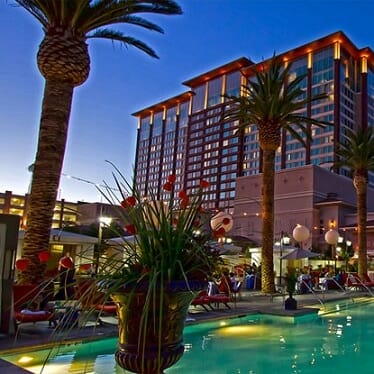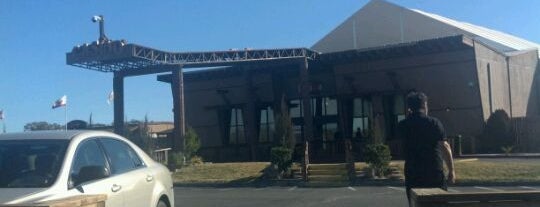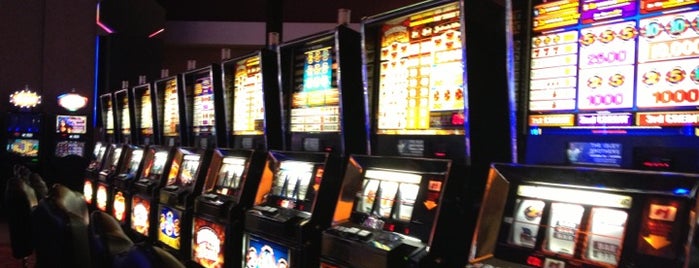Seven Clans Casino is proudly operated by the Red Lake Band of Chippewa Indians. All promotions, show-times, pricing, hours, and specials are subject to change/cancellation without notice at the discretion of management. Any person(s) entering the gaming floor must be 18 years of age or older. Rolling Hills Casino and Resort delivers the rejuvenation and exhilaration you’re looking for. Whether you prefer the cozy feel of The Inn at Rolling Hills Casino and Resort®, or the elegant and graceful stonework of The Lodge at Rolling Hills Casino and Resort®, we have an option perfect for you. The following Indian-owned casinos and bingo halls are located in the state of California. Click the casino or bingo hall name or photo to view more details. Agua Caliente Casino. Resort. Spa 32-250 Bob Hope Dr. By visiting Chumash Casino Resort, you automatically assume all risks related to exposure to COVID-19. Find Your Escape in the Heart of Wine Country. Experience the latest games, luxurious rooms, great dining and more among California’s rolling hills.
California’s rich gambling history predates its statehood. In fact, it wasn’t until California officially gained statehood that gambling became illegal. In the absence of legal gambling, sovereign Indian tribes that were not subject to state law took the opportunity to establish tribal casinos on reservation property.
Today, California’s tribal casinos are some of the most luxurious and well-reviewed hotspots for gambling in the state. There are 63 casinos operated by 61 different tribes, and the tribal casino industry itself generates well over $8 billion in revenue every year.
Why Are Tribal Casinos Legal In California?
The legal history between Indian tribes and the US government dates back to 1787. According to the United States Constitution, the federal government reserves the right to regulate commerce between states and Indian tribes.
In 1831-32, the US Supreme Court determined that tribes within the United States are their own independent political entities. This means that Indian territory technically is under its own legal jurisdiction that operates outside of state jurisdiction. Naturally, this extends to casinos that are built on reservation property.
According to federal law, the State of California cannot regulate tribal gambling enterprises unilaterally and enter a congressional pact. This interpretation resulted in the passing of the Indian Gaming Regulatory Act in 1988, which provides a statutory structure for all tribal gambling operations. Congress now allows tribal casinos to be built if they are ostensibly advancing three main goals: the economic development of a tribe, the self-sufficiency of a tribe, and the strengthening of a tribal government.
Though California initially banned most forms of gambling, some forms have been reauthorized over time. For example, in 1933, the state legalized horse race. In 1976, bingo games for charitable purposes became legal. Just a few years later, in 1984, California introduced the state lottery. As of today, however, brick-and-mortar casinos are still not legal on state soil.
But tribal soil isn’t the same thing. Currently, there are 63 casinos operated by 61 tribes. Tribal casinos are now mostly concentrated in the San Diego and Riverside Counties, containing 17 of the 63 still in operation.
In a nutshell, tribal casinos are legal in California because they technically aren’t on California soil.
Top Tribal Casinos In California
Out of all tribal casino networks, Indian casinos in California generate more revenue compared to any other in the United States. Tribal casinos generate over $8 million in annual revenue, even after payouts and fees to the California government.
As a result, Indian casinos in California vary dramatically in terms of appearance and theme, and they often include fantastic resorts, restaurants, and hotels. Many of the best casinos include hotels attached to their actual premises.

Southern California Indian Casinos
The majority of Southern California tribal casinos operate in San Diego, Riverside, San Bernardino, Santa Barbara, and Imperial counties. Here are the top five based on square footage and the number of slot machines each contains.
Pechanga Resort Casino
This expansive resort is the largest casino in California with 188,000 ft.² and 4,500 slot machines. It additionally boasts 20 restaurants and bars, a hotel with over 1,000 rooms, and a 25,000 ft.² spa. It’s located in beautiful wine country southwest of Riverside County.
Address: 45000 Pechanga Parkway, Temecula, CA 92592
San Manuel Casino
Check out this former bingo casino that is about to add a new hotel and spa, which are slated for completion in 2021. At this time, it includes a designated Asian gaming area of 5,000 ft.², a special collection of bars, and designated parking areas with more on the way.
Address: 777 San Manwell Blvd., Highland, CA 92346
Viejas Casino and Resort
This Four Diamond Casino and resort is only 36 miles east of San Diego and was recently remodeled in 2006. It features a high limit gaming area of 15,415 ft.², which also includes eight high limit tables. Close to 1,000 slot machines are available, along with three hotels and a selection of choice restaurants and bars.
Address: 5000 Willows Rd., Alpine, CA 91901
Morongo Casino Resort Spa
This casino is located just 20 minutes west of Palm Springs and recently underwent an expansion project that added 65,000 ft.² of gaming space to the resort. It currently features over 150,000 ft.² in total, with 2,700 slot machines and a poker room that allows for 13 private tables.
Address: 49750 Seminole Dr., Cabazon, CA 92230
Pala Casino Spa and Resort
This casino is in the northeast corner of San Diego County and features 650,000 ft.² of gaming space, with an additional 2,200 slot machines and 87 table games. A dozen restaurants and bars, plus over 500 hotel rooms and suites, make it an easy place to spend a lot of time and money.


Address: 11154 Highway 76, Pala, CA 92059
Check out our Complete Guide To Gambling In Southern California.
Northern California Indian Casinos
Most Northern California tribal casinos operate in Placer County and Yolo County. Here are the top five based on square footage and the number of slot machines each maintains.
Thunder Valley Casino Resort
This stunning casino is located just outside Sacramento. The iconic palm trees conjure up a feeling of summertime year-round. It features nearly 145,000 ft.² with 2,800 slot machines and 114 gaming tables, all open 24-hours daily. Bingo and live poker are also available, plus a selection of top-tier restaurants and a 297-room hotel in a 17-story tower.
Address: 1200 Athens Ave., Lincoln, CA 95648
Cache Creek Casino Resort
This resort and casino, located in Brooks, California, broke ground on a new hotel (which will feature almost 500 guest rooms) in 2017. It encompasses nearly 75,000 ft.² in total and includes 2,400 slot machines, 200 of which are in a non-smoking area.
Address: 14455 CA-16, Brooks, CA 95606
Table Mountain Casino
This casino is about 20 miles north of Fresno and is easy to reach via the CA-41 freeway. It was built in 1987 and is set to be replaced by a larger casino with an adjacent hotel, though ground has not yet broken. As of now, it includes 2,000 gaming machines and 40 table games, along with 10 poker tables.
Address: 8184 Table Mountain Rd., Friant, CA 93626
Tachi Palace Casino Resort

Opened in 1993, this casino is located in Lemoore in Kings County, drawing customers from both Northern and Southern California. It features over 2,000 slot machines and a seven table poker room, along with a 255 room hotel and spa that includes nine restaurants. A 45,000 square-foot concert venue rounds out its offerings.
Address: 17225 Jersey Ave., Lemoore, CA 93245
Red Hawk Casino
This casino is one of the most recent to be opened, having begun business in 2008. It’s just 30 miles east of Sacramento and includes 2,100 slot machines, 75 table games, and a designated high limit area of 91 slot games.
Address: 1 Red Hawk Blvd., Placerville, CA 95667
Check out our Complete Guide To Gambling In Northern California.
What Games Are Offered At Tribal Casinos In California
Tribal casinos in California, despite being outside state jurisdiction, are still heavily regulated. The IGRA divides all travel gambling operations into three distinct classes:
- Class I games are any social games that include prizes of minimal value or any traditional Indian games that are related to tribal celebrations and ceremonies.
- Class II games are games like bingo (electronic or otherwise), the lottery, any non-bank card games such as poker, and similar activities. These games all involve players that compete against one another rather than competing against the house.
- Class III games are any other types of gaming, which include slot machines, banked card games like blackjack, electronic games of chance, and so on. Notably, there are a few games that are illegal because of laws from the California Department of Justice. These exclusions include some types of dice games, craps, and roulette.
All this is to say that you can find a plethora of gambling activities on most tribal casinos. The exact offerings will vary from resort to resort, but you’ll almost always be able to find a selection of slot games, card games, and other games of chance.
Furthermore, some Indian casinos have private games or tournaments from time to time. It all depends on the exact casino’s offerings. For example, Morongo Casino Resort Spa includes several private poker tables that players can reserve ahead of time for serious or high-stakes games.
Indian Casino Near Willows Ca Menu
Tribal Gaming Revenue In California
All payments that tribal casinos make to state governments are dictated by “tribal-state” compacts. These are essentially agreements between the government of the state in which a sovereign Indian territory is located and the government of the tribe.
Tribes typically make payments to California government accounts based on the terms of those compacts. Most of the payments go toward special funds for dispersing grants to local towns that tribal casinos impact. For instance, this might include a town that needs to pay for frequent road renovation due to its proximity to a high-traffic tribal casino. Other grants may also be given to any native tribes that are not under the above compacts.
Casinos also deposit into accounts for the repaying of state transportation funds, especially for loans to the General Fund.
When it comes to revenue, most of the earnings from the casinos are exempt from federal, state, and local taxes. There are only a few exceptions. Whenever tribal members divide revenue evenly and distribute the earnings to members, for example, the federal government does get to take some taxes.
In addition, some large-scale casinos pay state taxes as part of their agreements with local governments. This normally only occurs if a casino drives significant traffic into the state and is otherwise a large part of a state’s economy. However, most casino revenue from gaming will go toward tribal government expenses and other charitable ventures.
Legal Gambling Developments In California
Recently, native tribes in California successfully lobbied to stop an amendment to California’s state constitution that would legalize sports betting and other gambling activities. The tribes have so far been explicit about their desire for limited sports betting legalization. They would prefer to exclude online wagering and allow sports betting at only a few select horse racetracks and tribal casinos.
The reasons for this are obvious. Tribes want to keep earnings from gambling activities within their casinos. However, given the legalization of sports betting across the country and the general push by the California public to allow for gambling, it’s not likely that the tribes will be able to stall the change forever.

Indian Casino Near Willows Ca Hotels
Furthermore, state officials know that legalizing gambling would bring billions of dollars in tax revenue into the state. As California’s economy is already hurting due to COVID-19, this would be seen as a much-needed revenue source.
Time will tell whether sports betting will make it to California next year, or if the fight will continue into the future.
California Tribal Casinos FAQ
Indian Casino Near Willows Campground
Technically, the legal gambling age for California Indian casinos is 18-years-old. However, the majority of casinos also sell alcohol. Thus, to comply with state-issued alcohol licenses, they usually don’t allow anyone under 21-years-old to enter the premises.
That largely depends on the type of game. Tribes regulate Class I games themselves. Tribes and the National Indian Gaming Commission together regulate Class II games, though the specifics may depend on the exact game and the circumstances. Tribal ordinances and US Department of the Interior-approved tribal-state compacts regulate Class III games.
Indian Casino Near Willows California
Furthermore, the NIGC can theoretically regulate and audit various tribal Class III operations. However, a 2006 appeals court decision highlighted some legal wiggle room.
Not yet. Currently, tribal casino boards are pressing to allow limited sports betting at their brick-and-mortar casino locations. They are not currently discussing online sports betting.
Yes. The majority of tribal casinos in California include rewards programs. These offer things like sign-up bonuses and special discounts on merchandise, food, hotel rooms, and more.
Casino Near Chicago
Indian Casino Near Willows Casino
No. California doesn’t allow online gambling, period, aside from unaffiliated sweepstakes sites.